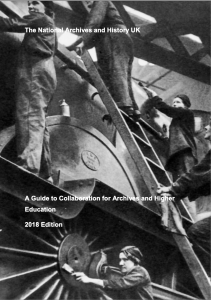This post is written by Caroline Sampson, Development Manager: National and Networks, The National Archives.
The National Archives’ (TNA) Higher Education Archive Programme (HEAP) and History UK came together recently in a Research Resilience event to look at emerging practices to support academic research and researchers wishing to use archives. While the disruption caused by the pandemic has clearly shone a spotlight on the barriers caused by service closures, restricted access and so forth, it is clear that some of these obstacles don’t surface solely during a global emergency, but can beleaguer the work of researchers on an everyday level too.
While it was great to hear the experiences of those who shared the work they have been doing over the last 18 months or so to try out creative new ways of facilitating research, it’s clear that this is part of an ongoing journey to explore exactly what barriers academic researchers experience and what opportunities there are to address these. What the pandemic has done is raise awareness of the extent of the difficulties and provided a testbed for creative solutions.

To make real headway with this, it is vitally important to bring academics and archivists together so that each group can understand the needs and challenges that the other faces. HEAP has attempted to do this in a variety of different ways but I’m left with a feeling that we have never quite managed to pull this off. You might find it useful to have a look at the Guide to Collaboration for Archives and Higher Education that TNA and History UK co-created in 2018.
If archivists don’t have a good understanding of the problems researchers are experiencing and of the changes that they would like to see, their attempts to redesign workflows will fall short of what’s needed. If researchers haven’t understood where the pinch points and constraints lie for archivists, they can’t use their voice to advocate for resources to bring about change.
So, a genuine call to arms! How can we get these conversations really working and get the right people talking to each other? If you have any thoughts, send them to me at caroline.sampson@nationalarchives.gov.uk
In the meantime, I thought it would be useful to share links to interesting resources and articles to read.
Digital Archive Learning Exchange (DALE)
The archivists amongst you might enjoy looking back at some of the events TNA’s DALE network have put on since the start of the pandemic. DALE was set up to support archivists as they explore digital challenges, build capacity and improve digital skills across the sector. Anyone is welcome to sign up for DALE events.
‘This time, it’s on the house’ – a webinar exploring how a range of services have continued to reach audiences during the pandemic
‘Strictly on the Download’ – digital preservation in action’: a webinar exploring how services are utilising digital preservation tools and resources to take next steps in delivering effective and high quality projects, and to think about the needs of a new generation of digital researchers.
‘Engage! Producing outstanding digital resources’ – The event included sessions on accessibility, demonstrating impact, developing online content for children, and running a remote volunteering project.
TNA blogs and articles
TNA has also shared a number of blogs that showcase different ways of working during the pandemic. Not all relate to academic research but the learning and experimentation may well prove transferable and / or spark ideas for new models of service delivery.
- Creating new ways to engage with young people and bring the archives to them.
- Adapting a student placement to work remotely.
- Accessing visual collections remotely.
- Thinking about Virtual Reading Rooms.
Training and skills development
Many of you will be familiar with this already but why not check out the postgraduate archival skills training?
It really does feel as if we are on the cusp of bringing about one of those “once in a generation” shifts in how we redefine the interface between archives and research. Over to you! What should it look like? How do we persuade decision-makers and funders to sign up? What do we do next?
You must be logged in to post a comment.